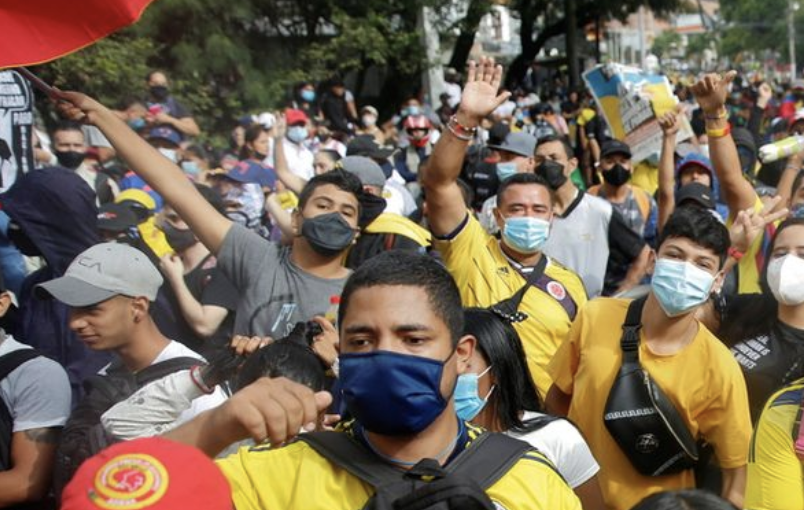
Jun 23, 2021 | Advocacy, Non-legal submissions
The ICJ joined over 300 civil society organisations in a statement to the UN Human Rights Council to express deep concern about the situation of human rights in Colombia during the presentation of the annual report of the UN High Commissioner for Human Rights.
The statement reads as follows:
“Thank you Madam President,
On behalf of the undersigned organisations, we thank the High Commissioner for her annual report, particularly on activities undertaken in Colombia. The situation in the country confirms the need for continued monitoring and provision of technical assistance by her Office
Throughout the eight weeks of mass protests that have spread to different cities throughout the country, we’ve seen killings, excessive use of force, acts amounting to torture and other ill-treatment, enforced disappearances, sexual violence, arbitrary detentions and attacks, including cyber-attacks against those exercising their right to protest, all of which constitute flagrant human rights violations. These violations are taking place in spite of a Supreme Court ruling ordering the security forces to refrain from acting violently and arbitrarily in a systemic manner during demonstrations, and calls by human rights mechanisms to cease these violations.
The protests are rooted in structural demands linked to the respect for human rights, and other concerns including poverty, inequality, growing social injustices, impunity, systemic racism and systematic violence against human rights defenders -including social, campesino, trade union and indigenous leaders and the press. They are also a result of the continued failure to fully implement the 2016 Peace Accord.
We urge the Council to call on Colombia to cease the use of violence and to respect the right to peaceful protest; to independently investigate human rights violations committed in this context; to accept the visit of the Special Procedures; and facilitate the building of social consensus around structural demands.
Finally, we ask the High Commissioner, through her Office in Colombia, to prepare a report on the human rights violations committed during the protests.
Thank you Madam President.”

Jun 21, 2021 | Advocacy, Non-legal submissions
The ICJ and Human Rights Watch today addressed the UN Human Rights Council in the Interactive Dialogue on the Report of the Office of the High Commissioner for Human Rights on COVID-19 responses and human rights.
The statement reads as follows:
Madam High Commissioner,
The ICJ and Human Rights Watch welcome your report on COVID-19 and human rights.
We believe that urgent action is needed beyond broad statements of condemnation of vaccine inequity. People without access to vaccines continue to live in fear of COVID-19 and, throughout the world, many continue to die.
Slow vaccine rollout continues across Southern Africa and Latin America and in Nepal and India despite the prevalence of quickly transmitting variants. In the face of such significant peril, Indian courts have questioned the rationality of government plans. In South Africa elite athletes and sports administrators have been vaccinated, while older persons and vulnerable populations continue to wait their turn.
Pharmaceutical companies impose far reaching non-disclosure agreements on governments which restrict access to health information necessary to combat corruption and ensure accountability. In Colombia, courts have ordered disclosure of contracts relating to COVID-19 vaccines despite such agreements.
COVID-19 response measures continue to be used in Cambodia, Thailand and Vietnam to restrict access to health information and stifle expression of human rights defenders. In Hungary similar tactics have been compounded by simultaneous attacks on judicial independence.
How will the OHCHR guide States on how to ensure effective judicial and other remedies are available for those whose human rights are threatened by inadequate or inequitable COVID-19 responses?
I thank you.”
Contact:Massimo Frigo, ICJ UN Representative, e: massimo.frigo(a)icj.org, t: +41797499949
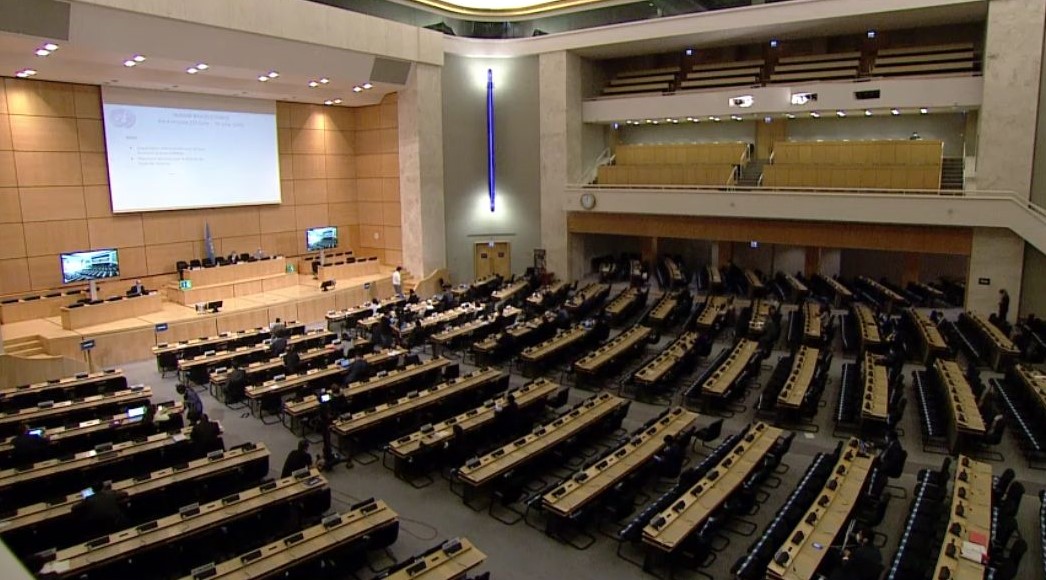
May 27, 2021 | Advocacy, Non-legal submissions
The ICJ today addressed an emergency Special Session of the UN Human Rights Council on the Occupied Palestinean Territories and Israel, calling for accountability for the serious violations of international humanitarian law and international human rights law committed by all parties.
The Special Session is expected to adopt a resolution to address this situation.
The ICJ statement read as follows:
“Madame President,
May 2021 has witnessed the commission of serious crimes under international law by Israel in occupied East Jerusalem and the West Bank, and by Israel and Palestinian armed groups in the context of the recent round of hostilities in the Gaza Strip. As in the past, the conflict exacted a heavy toll on civilians taking no part in hostilities, including more than 65 slain Palestinian children. Unlike the past, those responsible must be held criminally accountable for these crimes.
The International Commission of Jurists calls on the Council to establish a Commission of Inquiry to investigate serious violations of international humanitarian law and international human rights law committed by all parties with a view to:
- Establishing the facts, documenting, and reporting on alleged violations and abuses of international humanitarian law and international human rights law;
- Collecting and preserving evidence of crimes under international law committed in the West Bank, including East Jerusalem, Israel and in the context of the Gaza hostilities; and
- Identifying all those responsible for such crimes.
This Council should call on all States to cooperate with the ongoing investigation of the International Criminal Court. All States, and any mechanisms of this Council, should cooperate and share relevant information with the Commission of Inquiry.
Thank you.”
Contact:
Massimo Frigo, ICJ UN Representative, e: massimo.frigo(a)icj.org, t: +41797499949
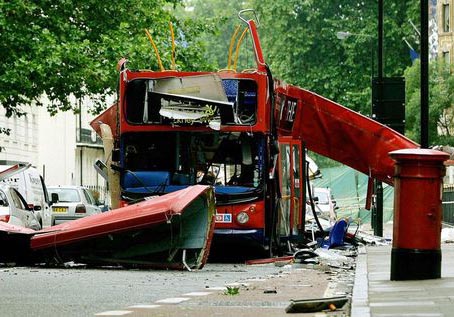
May 26, 2021 | Advocacy, Non-legal submissions
At a UN dialogue on counter-terrorism, the ICJ warned States and UN institutions against the use of overbroad and ill-defined concepts in the 7th revision of the UN Global Counter-Terrorism Strategy, because they could breach the principle of legality and undermine protections under international human rights law.
The ICJ intervened today in the virtual two-day dialogue with human rights and civil society partners on the theme of “Building a Better Paradigm to Prevent and Counter Terrorism,” organised by the United Nations Office of Counter-Terrorism (UNOCT) and the Permanent Mission of Spain to the United Nations.
The Dialogue brings together Member States, UN entities, human rights representatives, women groups, youth and civil society actors, as well as experts and other stakeholders for a practical exchange of views on how to address terrorism and violent extremism while safeguarding and promoting human rights, in particular the rights of women, children and victims of terrorism.
The ICJ Statement reads as follows:
“Madam Special Rapporteur, Your Excellencies, Colleagues,
Thank you very much for the organizing this consultation.
The International Commission of Jurists has been working for decades to ensure that counter-terrorism measures are compliant with, and do not lead to violations and abuses of human rights and the rule of law.
The ICJ has produced authoritative guidance, such as the ICJ Berlin Declaration on Upholding Human Rights and the Rule of Law in Combating Terrorism of 2004 and a four-year study concluded in 2009 by the ICJ Eminent Jurists Panel on Terrorism, Counter-Terrorism and Human Rights, the result of 16 hearings across the globe.
That Panel concluded that the approach many States had taken in short-circuiting foundational rule of law and human rights principles caused “enduring long term harm.”
The ICJ has been insistent that countering terrorism and protecting human rights are important objectives that not only are not in conflict, but are part of a single shield of protection that States must provide for.
This finding is as valid today as it was then, as the Global Counter-Terrorism Strategy itself recognizes that “when counter-terrorism efforts neglect the rule of law … and violate international law … they not only betray the values that they seek to uphold, but they may also further fuel violent extremism that can be conducive to terrorism.”
In this regard, we are concerned at the possible use in the UN Global Counter-Terrorism Strategy of undefined concepts and terms, like “violent extremism”, “violent nationalism”, political concepts of “far right” and “far left” or “extremism”.
The abusive invocation of these terms carries risks for the protection of freedom of expression, freedom of religion and belief, freedom of association and the right to political participation, all protected under international human rights law.
Critically, from a rule of law perspective, legal certainty is a key principle of human rights law that informs the requirement that any legitimate restrictions of human rights including when countering terrorism must be prescribed by law.
Any undefined or widely defined concept of terrorism or extremism should not be promoted or applied in international instruments, standards or strategies, that, where incorporated into national laws and practice, would lead to violations of this international human rights law violations.
In this regard, we share the assessment by the Special Rapporteur on the promotion and protection of human rights while countering terrorism in her 2020 report to the UN Human Rights Council (A/HRC/43/46) and by the OHCHR in its Report on best practices on countering violent extremism (A/HRC/33/29, para. 19).
Concepts like “violent extremism”, nationalism, political opinions and other forms of religious, ethnic, or other belief or opinion, however extreme, cannot be part of the GCTS, as they are otherwise protected by international human rights law guarantees to protect the rights to freedoms of expression, religion or belief, and/or of association.
Furthermore, their insertion would water down the anti-terrorism focus of the strategy and lead the way to the application of very pervasive measures clearly restrictive of human rights for conduct that is not linked to terrorism.
The Global Strategy should focus exclusively on countering terrorism. Any more expansive approach will risk leading to measures in breach of human rights law and, therefore, of the founding values of the UN under article 2 of the Charter.
I thank you.”
(The ICJ Statement is at minute 2:48:21)
ICJStatement-OCTSpainVirtualDialogue-SessionI-final (download the statement)
Contact:
Massimo Frigo, ICJ UN Representative, e: massimo.frigo(a)icj.org, t: +41797499949
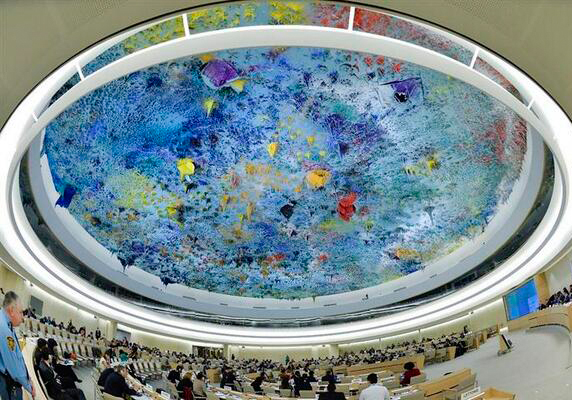
Mar 24, 2021 | Advocacy, Non-legal submissions
Today, at the close of the 46th regular session of the UN Human Rights Council in Geneva, the ICJ and other NGOs highlighted key achievements and failures.
The joint civil society statement, delivered by International Service for Human Rights (ISHR) on behalf of the group, outlines the main achievements and shortfalls of this last 46th regular session.
In the statement, the undersigned organisation comment on the engagement of civil society in online sessions, welcome the adoption of the resolution on vaccines and of resolutions to sustain scrutiny and accountability including in Belarus, Iran, Myanmar, Nicaragua, Sri Lanka, South Sudan and Syria. The NGOs have underlined the fact thatover 30 States have united in a long-overdue condemnation of Egypt’s misuse of counter-terrorism measures to imprison peaceful critics, and over 40 States raised concern over the shrinking civic space in Russia.
The civil society organisations have urged the Council to take prompt action on Algeria, Cameroon, China, India, and in Kashmir, and for the upcoming session, to set up an international accountability mechanism on the Philippines, and independent monitoring on pushbacks and other violations faced by migrants and refugees.
The statement is endorsed by:
- International Service for Human Rights;
- Franciscans International;
- Egyptian Initiative for Personal Rights (EIPR);
- International Commission of Jurists (ICJ);
- International Movement Against All Forms of Discrimination and Racism (IMADR);
- Asian Forum for Human Rights and Development (FORUM-ASIA);
- African Centre For Democracy And Human Rights Studies;
- International Federation for Human Rights Leagues (FIDH);
- MENA Rights Group;
- International Lesbian and Gay Association;
- Impact Iran;
- Ensemble contre la Peine de Mort (ECPM);
- Siamak Pourzand Foundation;
- Cairo Institute for Human Rights Studies (CIHRS);
- ARTICLE 19;
- CIVICUS: World Alliance for Citizen Participation.
Read the full statement: UN-JointStatement-UNHRC46-Advocacy-EndOfSession-ENG-2021
Contact:
Massimo Frigo, ICJ UN Representative, e: massimo.frigo(a)icj.org, t: +41797499949
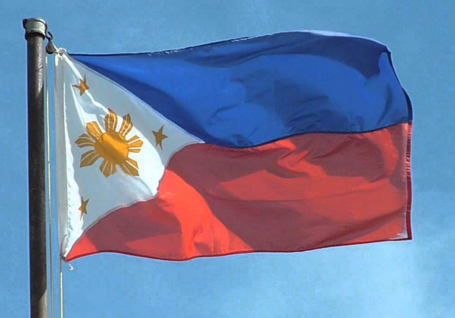
Mar 22, 2021 | Advocacy, Non-legal submissions
The ICJ joined today seven other organisation in a statement before the UN Human Rights Council expressing concern at the systematic human rights violation and the persistent impunity in the Philippines and calling for more accountability.
The joint statement delivered by FORUM ASIA reads as follows:
“Madam President,
Nearly six months since its adoption, Human Rights Council resolution 45/33 offering technical assistance to the Philippines has proven to be utterly insufficient to address the systematic human rights violations and persistent impunity documented in the High Commissioner’s report. The Philippine Government’s policies and actions since the Resolution’s adoption have been completely at odds with the commitments outlined in it.
Extrajudicial killings in the so-called ‘war on drugs’ have continued. To date, the Government has made no tangible progress towards accountability against those most responsible for such killings. In December 2020, the Office of the Prosecutor of the ICC found that there is “reasonable basis to believe that the crimes against humanity” of murder, torture, the infliction of serious physical injury and mental harm, and other inhumane acts were committed between at least 1 July 2016 and 16 March 2019.
Human rights defenders pursuing legitimate work, especially those who advocate for international accountability, including lawyers, continue to be attacked and accused of belonging to terrorist groups. Rights defenders continue to be arrested and jailed. The draconian Anti-terrorism Act, passed last year, exacerbates risks to defenders. The killing of nine human rights defenders and activists on 7 March, two days after President Duterte ordered the police and military to “finish off” and “kill” those purported to be “communist rebels”, illustrates clearly the persistent killings and attacks faced by activists and defenders. It is very clear that no amount of technical assistance or capacity building will end the killings as the President and top government officials continue to incite murder and violence as official policy.
In this context, it is imperative that the Council set up an international accountability mechanism to end the cycle of violence and impunity in the Philippines.
Thank you.”
The statement was endorsed by:
- Amnesty International
- Asian Forum for Human Rights and Development (FORUM-ASIA)
- CIVICUS: World Alliance for Citizen Participation
- Human Rigths Watch
- International Commission of Jurists (ICJ)
- International Federation for Human Rights (FIDH)
- Philippines Alliance of Human Rights Advocates (PAHRA)
- World Organisation Against Torture (OMCT)
Contact:
Massimo Frigo, ICJ UN Representative, e: massimo.frigo(a)icj.org, t: +41797499949










